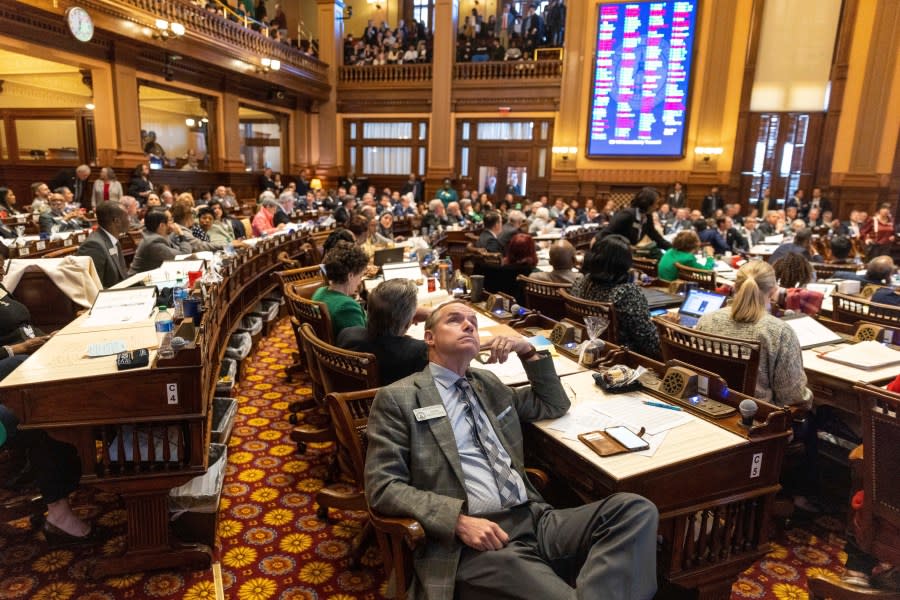Conservatives push back at GOP effort to regulate gender content in Georgia private schools

A proposed Georgia law dictating that even private schools can’t teach students about gender identity or queer theory without parental approval is dividing conservatives and school choice advocates.
While Republicans often tout private schools as a way to help keep the government out of a child’s education, they have also been leading the charge in restricting the ways gender can be taught in public schools.
Now, they are targeting private ones too in a move that could split support.
“I think that this is a major overreach. One of the most basic benefits of choice in education and especially of just being able to choose a private school is people with different values can choose schools based on the policies they have, and those policies can be different,” said Neal McCluskey, director of the Cato Institute’s Center for Educational Freedom.
Georgia Senate Bill 88, which last week cleared committee and is heading to the full chamber, would require private schools to provide permission slips to parents before “addressing issues of gender identity, queer theory, gender ideology, or gender transition.”
“We have been working on this bill for 3 years. We have worked with and accepted changes from multiple groups. We took their concerns to heart, and we did not say ‘NO’ to one group who came to us,” state Sen. Carden Summers (R) said in an email to The Hill.
“We have worked in earnest to make this bill fair while still achieving our goal of making sure children’s parents are involved in these sensitive and often life changing issues. This is a Transparency bill – nothing more,” Summers added.
The measure comes as Republicans in recent years have increasingly sought to make it easier for students to attend private schools, seeing them as a way to allow parents more choice over lesson plans and curricula.
In the past two years, more than a dozen red or red-leaning states have expanded education saving accounts that make it easier for parents to choose private or homeschooling options for their students. At the same time time, states have passed laws banning the teaching of gender identity for certain ages in public schools.
But combining the issues under one umbrella shows the differences between advocates on the two topics, according to Jon Valant, director of the Brown Center on Education Policy at the Brookings Institution.
“There’s a group that is kind of private school choice advocates, and there’s a group of what I would call cultural warriors, and they don’t always see eye-to-eye on all these issues,” Valant said.
“I think what we’re seeing there is a conflict between that desire from one group to sort of keep government out of private schools and the conflict between that and the more cultural warrior segment of the conservatives in education right now who really aren’t as concerned about policy as they are about politics,” he added. “And so I think this particular bill has sort of brought that conflict and like that distinction between those two segments of that party into view.”
Both issues fall under the traditional GOP umbrella of “parental rights,” which legislators have said focuses on transparency in schools and what children are taught.
But the bill in Georgia, opponents argue, is limiting the exact parental rights that Republicans have been fighting for.
The legislation “misses that some parents may think that that’s the right atmosphere for their kids, [an atmosphere] where there is 100 percent trust in adults in the school and when a student tells something it won’t be shared with a parent so that student will feel more free to share things that they’re struggling with,” McCluskey said.
“If a school has a policy that doesn’t share with parents or policy that it won’t share what their children say about their sexuality, parents freely choose that school, especially if they know that policy,” McCluskey said, arguing the move would “reduce parental rights.”
Jonathan Butcher, the Will Skillman Senior Research Fellow in Education Policy at The Heritage Foundation, says “parents should be and voters should be wary of state lawmakers looking to enact additional regulations” on private schools.
“It is also true, though, that this issue of teaching young children especially the idea that someone can ‘choose their gender’ is of great concern,” Butcher said, adding that “what is appropriate” to legislate is “medical notification.”
Under Georgia House Bill 1045, educators in private schools would not be allowed to tell students to withhold information about their gender from their parents or withhold information themselves about a student’s gender from the child’s parents.
“Anyone who has the responsibility over the care of a child,” Butcher said, should keep “the parent informed about anything related to a child’s medical status.”
“I would argue even consent obtained from parents” would be needed “before a child is addressed by a name or a pronoun that doesn’t correspond with their birth certificate,” he added.
Experts say both bills currently are unlikely to get replicated in other states, and that even efforts to do so would face general pushback.
“You have clear opposition from Democrats across the board to anything that looks like this because, again, of that targeting of LGBTQ+ students, and then throw in the mix there that I think you’re going to have a lot of Republican opposition and a lot of places just based on concerns about regulation. I would be surprised if this became a popular state policy. Now if it does, I think it’s extremely concerning,” Valant said.
For the latest news, weather, sports, and streaming video, head to The Hill.

 Yahoo News
Yahoo News 
